Crestline Experimental Dive Unit
Announcing the next step in
homebuilt technology:
CEDU is Night Vision Capable
Rebreather Diving by the Light of the Silvery Moon
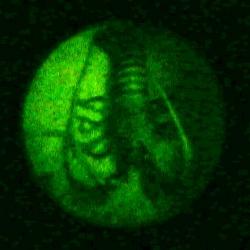
Do I dare say what tonight's object d'interest
was.
Crestline Experimental Dive Unit
Announcing the next step in
homebuilt technology:
CEDU is Night Vision Capable
Rebreather Diving by the Light of the Silvery Moon

Do I dare say what tonight's object d'interest
was.
Yes, you can say that the Crestline Experimental Dive Unit has "stepped into darkness" by its development of materials and techniques for totally lights out closed circuit rebreather night diving. CEDU's latest underwater night vision equipment follows.
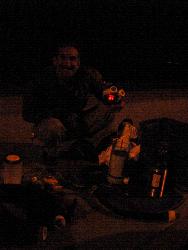
Bob prepares the FEOR Light for Night Diving.
(All equipment, including gas supply,
chemistry, batteries and calibration, is given a final check just
before the night dive.)
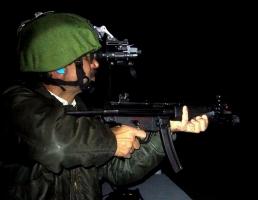
Dry training with terrestrial night vision equipment.
(A "dry run" training session is
conducted prior to an operation, in order to insure operator familiarity
with the equipment. )
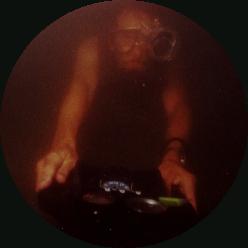
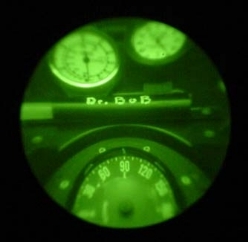
"Wet" training with the CEDU NV1
(Our first generation underwater Night Vision device.)
Night diving has always been enjoyable, as many of you divers may agree.
No doubt that almost everyone one of you have turned off your dive
light at some time or another during during a night dive, and was rewarded
by new discoveries. Discoveries such as the phenomena of bioluminescence,
or the fact that you can actually see things underwater at all, just from
the ambient lighting, be it from the stars and moonlight, or man made lighting
from the shore or ships nearby. (And I even
bet that there are more than just a few of you out there who actually conducted
an entire dive without using auxiliary attention getting hand held flood
lighting.) The rewards and discoveries of diving in the dark are
many.
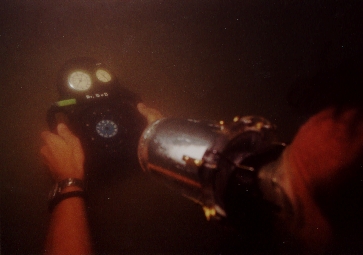
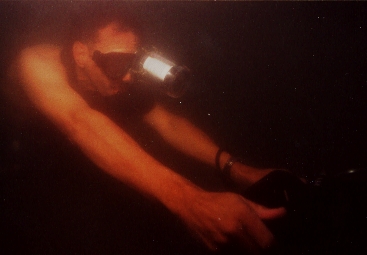
We at the CEDU have taking the next step in night diving, . . . that of conducting entire dives while using Night Vision technology. And not just any piece of night vision equipment, but CEDU's NV1, our very own first generation, dive mask w/ integrated starlight scope.
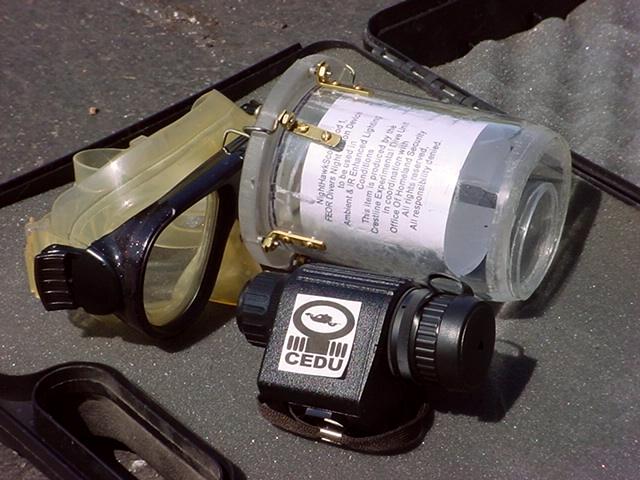
NV1
The NV1 is basically a first generation image intensifier tube, mounted within an acrylic waterproof housing, and affixed to a scuba divers facemask for hands free use. The NV1 as shown above, consists of four parts; (1) the image intensifier tube, (2) the waterproof housing, (3) the mask attachment & positioning harness, and (4) the divers mask.
The NV1 produces a small image with an intensified field superimposed and axially aligned to central focus within the divers wider field of forward view. (There is no "double vision" while looking straight ahead.)
The orientation geometry of the NV1 device results in the operator viewing a small (22.5 degree FOV) green light intensified disc from the left eye, superimposed within the larger overall field of view generated by both eyes of the diver. The image is in 1:1 magnification. Vision peripheral to the intensified disc of the night vision device is not affected, nor is straight ahead vision with the right eye. (The overall field of view registered by the diver is ultimately dictated by the design of the facemask.)
The focus is set for the divers instruments, as the purpose of this equipment is to allow for starlight compass navigation. Adjusting the focus for greater distance has not had a benefit for underwater use due to the normally restricted visibility underwater. (On the surface while in dark theaters, a long distance focus is satisfactory.)
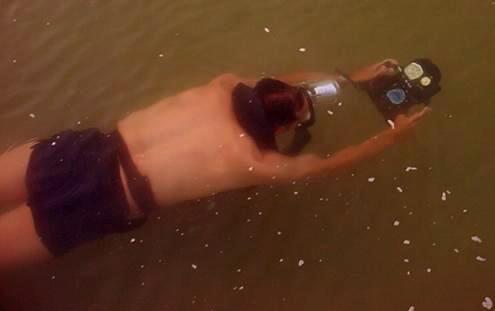
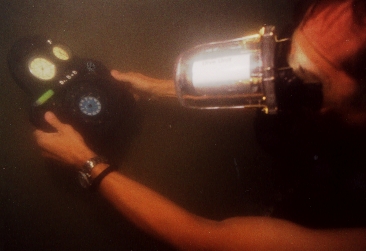
As can be seen, the CEDU NV1 should not be considered a trivial attachment to the divers mask. The weight of the NV1, though neutrally buoyant in salt water does occupy space and contains mass. This is not a device to be wearing on the face while traversing a heavy surf zone.
In operation, the NV1/mask assembly would be carried in a pouch or game bag until out of heavy surf or swell conditions, and/or ready to use in the compass navigation mode of the dive.
In normal CEDU buddy team operations, one diver would be assigned to the navigation part of the dive. When starting the navigation portion of the dive, the navigator would remove his normal swimming mask and stow it around his neck. He would put on the NV1/mask assembly. At the end of the navigation portion, and before any other (tactical) operations, he would remove and stow the NV1, and replace his normal swim mask. The buddy diver in this pair could be carrying the NV2, (a hand held only version of the NV1 which has been preset for longer focus), for checking an area ahead of the swim pair, or for the rare occasional "on the surface" use.)
On what I call a "lobster run", (i.e. a solo dive), the NV1 is carried in a gear bag. Dive masks are switched upon reaching the designated area of interest (the hunt zone). As mentioned above, it is not practical to traverse a surf zone, or attempt any rapid head movements while wearing the CEDU NV1, as mask leakage or dislodgment could occur. (Correction: Does occur!)
In conclusion, the NV1 provides an additional capability to the night diver. It may not be for everyone, as additional proficiency and training is required. But in the right hands, it can extend the pleasures, and operational capabilities that you, or your orginazation gets from the sea.
Thank you,
Dr. Bob, Director
Crestline Experimental Dive Unit
CEDU: Leaders in Homebuilt Technology
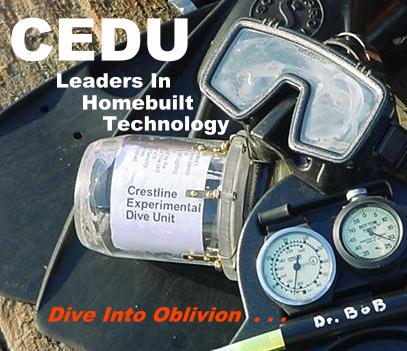
Leave no Bubbles
Take only
pictures,
Do it in the Dark
"To
Swim Is Human, To Dive Is SUBLIME"
To
bag a bug in total darkness . . . . is just the next step.
Dr. Bob's Rebreather Main Page NV2, hand held Night Vision device